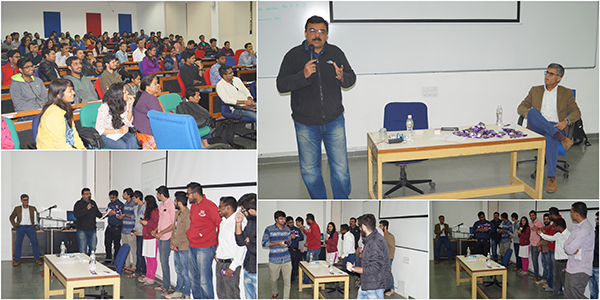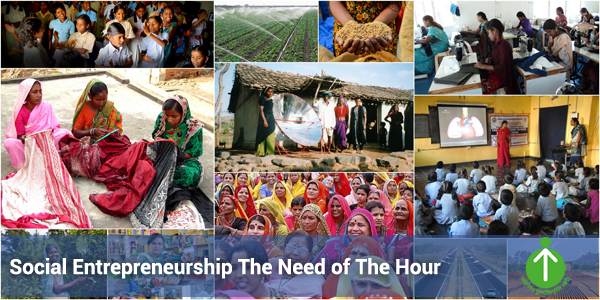Importance of rural entrepreneurship in the Indian economy
Posted on September 11, 2018 inSocial Entrepreneurship
Economic development of any country largely depends upon the rural entrepreneurship. The growth and development of rural industries facilitate self-employment. It also helps in the maximum utilization of locally available raw materials and labor. Following are some of the roles that rural entrepreneurship plays to ensure the betterment of the society and the country in general at a larger level.
Employment generation: Rural industries play a significant role in employment generation in India with providing large-scale opportunities to laborers of rural areas. Unemployment in rural India can be tackled through rural industrialization.
Foreign exchange influx: We can attract more foreign exchange with the help of rural industrialization. Products that get produced in industries can be exported to other countries at a larger level thereby ensuring the better influx of foreign exchange in the country.
Entrepreneurial development: Entrepreneurial activities can largely take place in rural areas by young and promising entrepreneurs with an aim of the betterment of the society, improvement in livelihoods, creating resources of earning for rural people. It facilitates the development of rural areas.
Proper utilization of local resources: Rural industries help in the proper utilization of local resources like raw materials and labor for productive purposes and thus increases productivity. They can also mobilize rural savings which help in increase of rural funds.
Betterment of society: Rural industrialization can result in more employment generation thereby providing livelihoods resources to the plethora of people. It’s directly proportional to the betterment of society. It creates jobs while securing earnings. Development of an individual in rural areas could impact to the growth of the economy at the same time.
Migration: Migration issue can be sorted out largely by providing employment and earning opportunities to the people of rural India. Issues occurred by migration of masses would be nullified once the rural industrialization takes place in rural areas of India. In recent times, rapid migration has caused the imbalance in the society at a notable scale. This way it can be helpful to check the migration and help the economic development at a significant level.
This way rural entrepreneurship could boost the Indian economy and help it sustain in years to come in an effective manner. It can surely bolster the Indian market to rank among few other developed countries in the top level.
Exploring Rural Entrepreneurship in India
Posted on August 9, 2017 inEntrepreneurs, PGDM - Development Studies, Social Entrepreneurship, Village Entrepreneurship Programme

Starting, owning and managing a start-up business by optimum utilization of local resources for the development of a rural population is what rural entrepreneurship means.
We have seen an influx of rural migration into the cities in search of employment, resulting in overpopulation in the urban areas. To prevent such a situation and to minimize migration owing to unemployment, we need to create situations that create opportunities of employment in the rural areas itself. Value addition to rural resources in rural areas, engaging rural human resources is Rural Entrepreneurship in its truest form.
In countries like India, the need for rural entrepreneurship is very strong and the reasons are, employment generation, income generation, rural development and making villages self-sufficient. Doing so will invariably prompt the villagers to earn and live where they belong rather than moving to bigger towns and cities thus curbing rural to urban migration. An ideal situation would be when citizens from cities and towns find it worthwhile to shift themselves to rural areas looking at the vast possibilities and opportunities that are waiting to be tapped.
Young people with a creative and positive perspective, who aim to work towards the development of rural areas using rightly channelized efforts will be the ones to bring about a drastic change in the situation we see today. These dynamic rural entrepreneurs shall be successful in solving many such chronic problems within a short time span and make a mark in the industry while doubling their profits.
The rapid growth in population and an even faster rate of urbanization creates an increase in demands which are challenging for the traditional small-scale businesses who cannot cope up with the demand and supply cycle. This is where new and innovative solutions of an entrepreneur come in. Bringing in all-new global concepts, business strategies, information technology and a highly efficient infrastructure, the entrepreneur would have all the right tools in hand to chisel out one of the finest masterpiece in rural entrepreneurship.
Most of the industries in the rural sector are small-scale and cottage industries with a huge potential for growth. While being quick yielding they also provide large employment opportunities, which indirectly means, a smaller gestation period and cheaper labour as compared to the urban industries, ultimately resulting in better profit margins.
A host of opportunities are open for rural entrepreneurs and the categories they relate to are Food processing and Agro products, textile industry, cottage and handicraft industry, mineral based industry, engineering related and service industry.
Those who aspire to make it big in the world of rural entrepreneurship need to decide on the type of entrepreneurship suitable for their business and may choose from the following:
Individual entrepreneurship, which is a proprietary concern and a single ownership of an enterprise.
Group entrepreneurship is a partnership and can also be a public or private limited company.
Cluster formation relates to associations consisting of a group of individuals sharing the same interest, religion, caste or occupation etc. which are known as Non-Governmental Organizations (NGOs), Voluntary Organization (VOs), Self-Help Groups (SHGs), Community-Based Organizations (CBOs) and networking of all these.
Co-operatives are autonomous associations of persons united voluntarily for a common purpose.
It is not necessary that those who prefer rural entrepreneurship need to be from rural areas themselves. Enterprising urban citizens who are earnest and sincere enough to ensure and manage rural development must take up innovative projects and also promote the benefits of rural entrepreneurship to others.
[Top]Social Entrepreneurship The Need of The Hour
Posted on April 27, 2016 inPGDM - Development Studies, Social Entrepreneurship
For an aspiring entrepreneur or student who wants to enter the business world with a management degree in hand, it becomes extremely difficult to choose which programme to opt for. After all, there are a large number of management institutes in India to choose from which offer PGDM courses in various fields like Finance, Marketing, HR, Operations, International Business, and Brand Management. So how does one choose? The first step is to look at what the course offers and where your interests lie.
The PGDM-DS Programme at the EDII
The PG Diploma in Management – Development Studies is a highly acclaimed course in entrepreneurship management in India. It has the honour of being the flagship course of EDII, which is a renowned and prestigious institution in India and boasts a vast alumni network. In fact, EDII commands a reputation in the industry that is hard to ignore.
What are the Benefits of a PGDM-DS Degree?
Development studies is categorized under social sciences and is actually one of the most popular specialized management programmes because companies all over the world require regional development studies specialists. The focus of this programme is to train students to work in the various economic, political and social sectors. The curriculum of this programme is tweaked to enable students to study, analyse and understand the various development policies that have altered the society that we live in.
The benefits of the PGDM-DS Programme are as follows:
• It will help students to analyse and understand historical, economic, social and political factors that are a part of interpreting complex development problems.
• It will introduce students to various factors influencing development in developing countries.
• It will enable students to get a critical understanding of the issues that developing countries and societies face.
• It will provide them with the necessary skills and knowledge to help solve some of these issues and come up with creative and innovative solutions.
After graduating from the PGDM-DS programme, every student will have a unique understanding of the society as it is today and be able to critically analyse the factors that influence developing countries.
Placements
EDII has a wonderful placement record due to its excellent and far reaching alumni network, its valuable contacts in the industry and the fact that EDII students are given opportunities to work with the best companies in the country and have intellectually stimulating and worthwhile careers.
Some of the well-known social venture organisations that EDII students get placed in are Azim Premji Foundation, SEWA, Chetna, Unnati, Aga Khan Rural Support Programme, NRLM, FWWB, Utthan, and AKRSP.
How PGDM-DS offers more that MHRM?
An MBA in HR or MHRM (Masters in Human Resource Management) degree will only enable you to pursue a career in Human Resource Management by training you in the fields of selection, recruitment, training and development and labour laws. It will not guide you towards a satisfying career in the field of national and international development work. The PGDM-DS programme of the EDII is, indeed, a value added programme which will provide you with all you need to work in the field of development studies i.e. skills, hands-on practical experience and technical skills.
Students who have graduated from the PGDM-DS programme at EDII are in demand due to their vast and specialized knowledge of the development studies field. They know how to create and manage social initiatives that will actually improve the situation for the urban and rural poor.
[Top]Lecture Series 2016 – Social Entrepreneurship
Posted on March 9, 2016 inSocial Entrepreneurship

As part of our Lecture Series we had the opportunity to interact with some Prabhat Agarwal and Sandeep Sachdeva
We thank Mr Prabhat Agarwal and Mr Sandeep Sachdeva, for sharing the journey of their social entrepreneurship ventures, Janta Meals and Safe-in-India, with us. Your practical (and happy) explanation of unequal distribution of wealth and its impact on the world was persuasive and inspiring. The lecture cajoled, touched many hearts, alleviated some fears and led to a shift in perception about social ventures.
Their stories of Indian and International social ventures were highly instructive and messages contagious. Beginnings with identifying a problem that can be solved for the benefit of the society, creating a sustainable business model and working towards technical and non-technical solutions needed by the huge scale opportunity that India offers. Their practical examples debunked the myth that an organisation cannot make profits keeping social good in mind.
Clearly, everyone who wants to make a difference need not always be company founders. We need hundreds to manage such organizations, advocate for them, lead their technological innovations and get involved in all aspects of their business models.
[Top]

